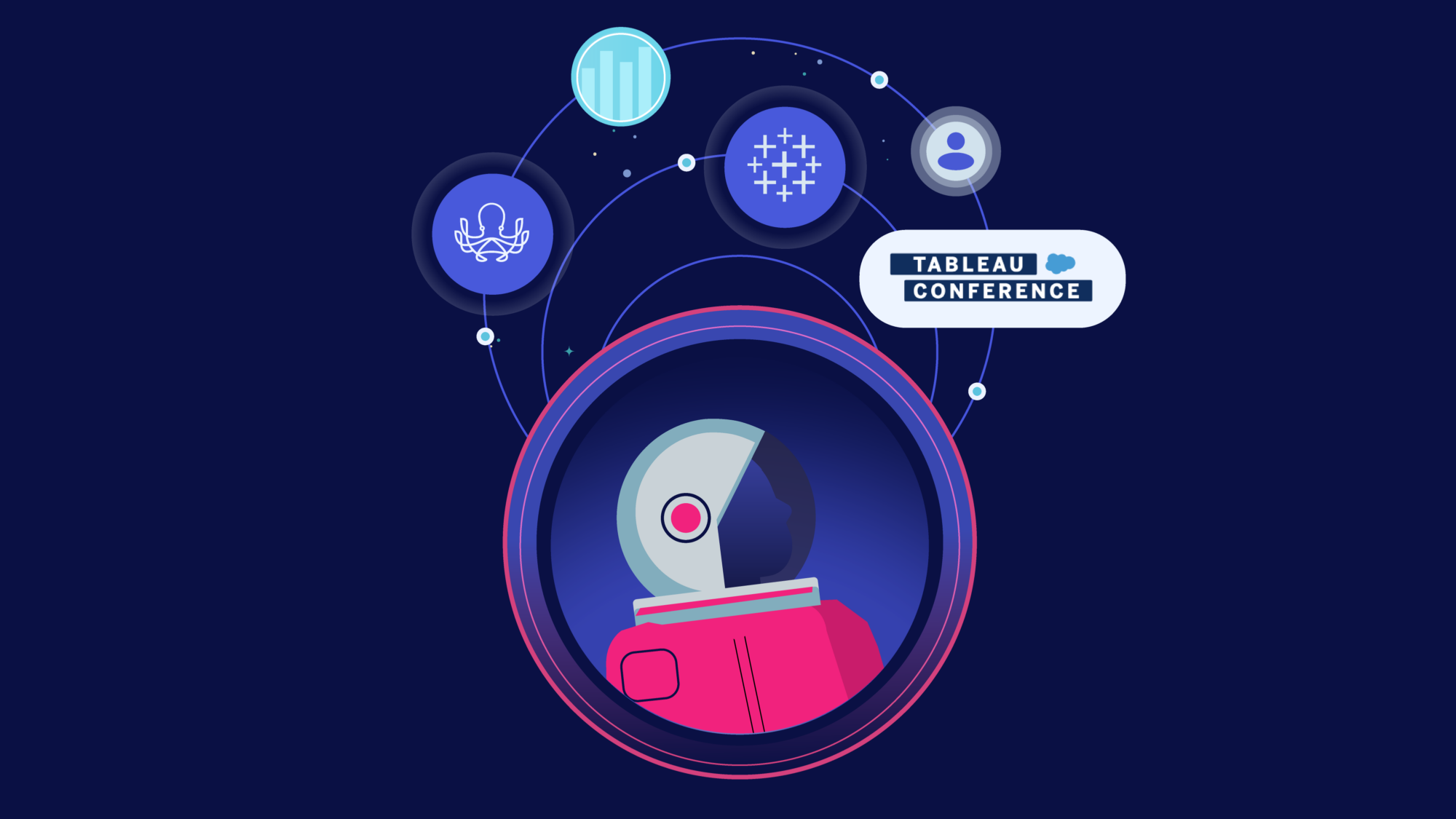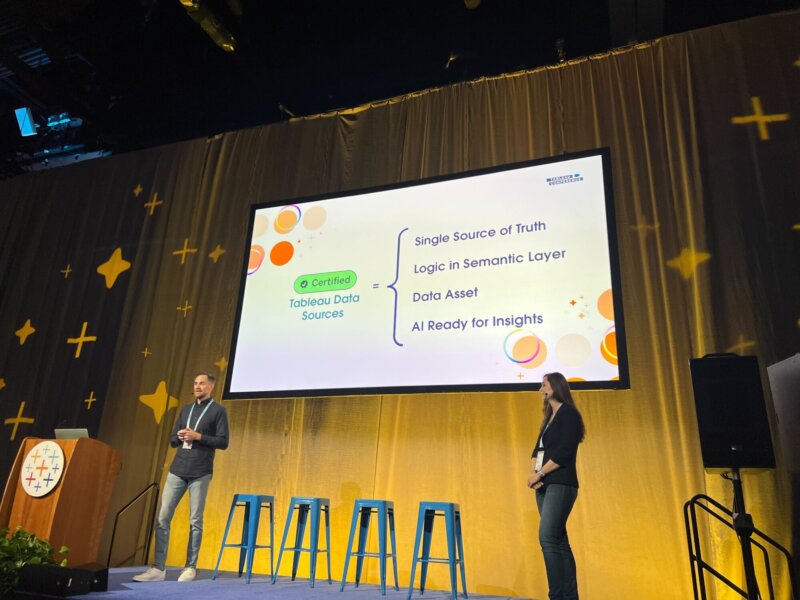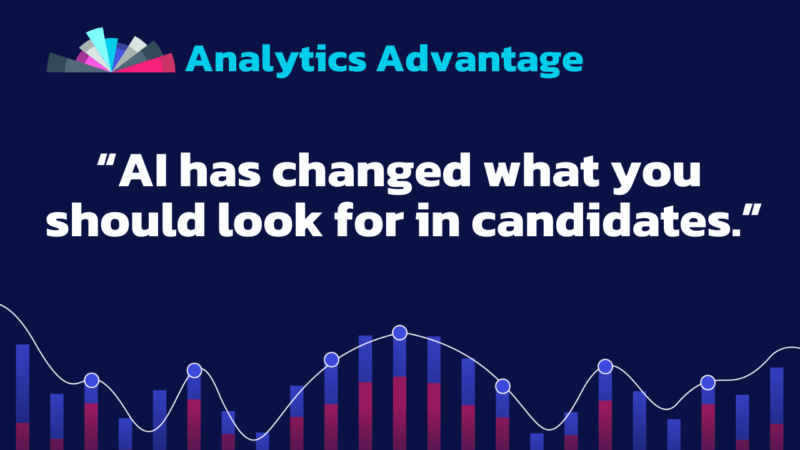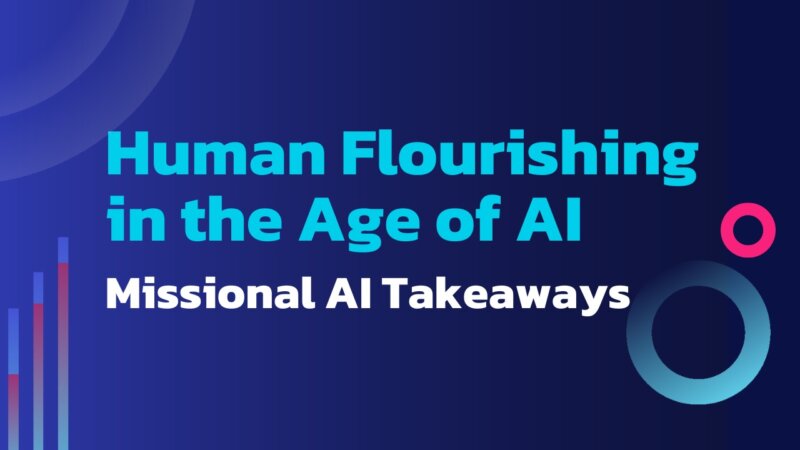
Thought Leadership
Interview with Author and Data Analyst Annie Nelson
Annie Nelson is a well-known data professional in the Tableau community, widely recognized for her popular content on LinkedIn and TikTok where she guides aspiring data analysts through the early stages of their career. A former occupational therapist turned data analyst, Annie now works at GitLab, a DevOps platform that helps teams collaborate on code, automate and test deployments, and manage full software development processes in one place.
At Tableau Conference 2025, she led a session titled “Your Data Ain’t Ready: Build an AI-Ready Trusted Data Layer” along with her co-worker, Nelson Scoville, GitLab’s Senior Business Intelligence Admin. Together, they shared GitLab’s approach to overcoming AI implementation challenges by building a trusted and centralized data foundation. Their session highlighted how GitLab tests AI-readiness through creating Tableau Pulse metrics and building an intelligent business system that separates ad-hoc requests from production content workflows to create a single source of truth.
After the session, I was able to sit down with Annie to talk about her career journey, making the most of conferences like TC25, and the future of work in an AI-driven environment.

Autumn Kloth: As a newbie to the Tableau Conference, what in your opinion is the best part of this event?
Annie Nelson: You know, I think it’s the people. I think it’s the networking you get to do, the conversations you have. Sessions can sometimes be really good, but sometimes, they can feel like a marketing ploy, you know? And it’s kind of hard to figure out which one you’re going to get before you sign up.
I feel like I always learn the most after sessions, talking to people, and just asking questions. And meetups and Data Night out, just asking people about Tableau and how they’re using it. The conversations that you have, the friendships that you form. I think this is true for any conference, not just Tableau.
Autumn: Are there any must-do’s at the conference – like specific sessions or keynotes? Is there something I should do before the conference is over?
Annie: I think if you can try and put yourself out there to talk to new people. I know it’s hard, but if you can try and talk to speakers after sessions.
Something that I give advice to people on before conferences is to look at all the speakers who you’re most excited about. If you’re genuinely excited for their session, send them a message on LinkedIn (which you did to connect with me), and say, “Hey, I’m excited to see your session. I’m really interested in this topic. If there’s time afterwards, I’ll come up and say hello.”
Autumn. Yeah, that’s super easy, and it makes you stand out.
Annie: That’s how I got my current job – that’s what I did with the VP of data and analytics at GitLab. She was doing a session, and I went up and spoke to her. She remembered that I’d messaged her – we talked for a while and a couple of weeks after the conference, when a job came open, she reached out to me on LinkedIn and said, “Hey, we’re looking for someone. Are you interested?”
Autumn: Yeah, I’ve definitely noticed that in the data world, connections are so important, building relationships is important.
I remember, from reading your book, How to Become a Data Analyst, that you used to be an occupational therapist. It seems like a lot of Tableau users, and people in the data world, didn’t start out in this world. How has your past work experiences helped you, even if they weren’t specifically data related?
Annie: I think that, generally, my career success is because of my history. Being technical is, surprisingly, the easiest part of my job. I think the success I’ve had in my career is because I know how to work with people, how to talk to people. I know how to think critically and independently. I have a good business sense, not because I have a business background, but because I can think about what’s important to the people I’m talking to. I think it comes back to empathy and being able to understand people. I hesitate to call it “soft skills” because I’ve recently been trying to retrain myself not to call it that. I think that as soon as you associate it with soft skills, you associate it with women and of lower value, but any successful CEO that you see out there, they have amazing soft skills. They, of course, might call it “leadership skills,” or whatever. I haven’t figured out exactly what I want to call it–if leadership skills is the right way to frame it, but it’s essentially soft skills and every successful person you’ve seen, men and women, exhibit it. These skills are what I’ve learned in my past, and that’s, I think, why I’m successful.
Autumn: I agree. I look at my boss, Action’s Founder, Keith Helfrich. He has amazing communication and people skills.
You’ve documented a lot of your analytics journey on LinkedIn and TikTok and you’ve got a sizable online following. How did publicly sharing your progress influence your career opportunities?
Annie: I probably wouldn’t have actually become a data analyst if I hadn’t shared my process of learning data analytics on TikTok. People were so supportive and welcoming there and it made me curious to keep trying. If it wasn’t for that, I probably wouldn’t have tried to get a job.
When I was looking for my first job, I’d been creating content about Tableau, and an executive at a small consulting organization saw me and reached out. So that’s how I got that job and then I got my current job at GitLab through a Tableau conference. But part of the reason I was able to get it is because I did the strategy that I suggested earlier of messaging speakers ahead of time.
And secondly, after I went home from the conference, I shared a lot of content about Tableau, about enabling Tableau, all these things, and so I don’t know if I would have stuck in her mind or not, but I do know that every time she logged into LinkedIn in the weeks after the conference, she saw me talking about how to use Tableau at the organizational level, and that’s what she was hiring for at the moment.
Autumn: That is so cool.
This question kind of falls into what you just said. How important do you think it is to be producing content on social media and having a source of creativity that other people can see?
Autumn: I think it’s great and I encourage people to explore it, but only if they want to. One thing I’ve noticed online is that some content creators on LinkedIn will say, “Oh my God, you have to have a personal brand, you have to always be creating content!” And they’ll push people, telling them they must do it. I don’t think there’s initially enough of an ROI that it’s worth investing a lot of time on. If it’s not something that you’re interested in, that’s OK. I think you really only have to have a good LinkedIn profile with a good headshot, good headline, a good bio, your experience, maybe some featured posts with projects that you’ve worked on–it should make a good first impression. But if creating regular content is a chore for you, if it’s not fun, then it’s not worth it. It can be a tremendous amount of work.
If it’s something that you enjoy doing, then I think it’s worth it, as my career path shows.
Autumn: One last question, Annie. In your session, you talked about creating LLMs, something you’ve been working on at GitLab. That’s something I’m really interested in. But I’ve been a part of internships where they want us to use ChatGPT, but their VPN literally denies access to it. They say they want to be on the AI curve, but they fear the security issues. Do you have any recommendations on how to get around such contradictory situations?
Annie: I think, if you can build the business case for it; talk to management. Our CEO sees the value of everybody having access, and so we have Duo, an AI tool that’s designed for the entire software development life cycle, and it’s the best I’ve experienced at writing code. It’s GitLabs’ own AI product. It’s really good. It can have a big context window, so you can put a lot of information into it and a lot of code.
Whenever I personally write, I don’t write Python, but I do with AI, and it produces by far the best Python code. So, we have that, but we also have access to Cloud and we can directly connect our database. What files to it. Our CEO said I want to bet on our people. I want our people to accelerate their work — I don’t want to replace them. And so he got us all access, so we didn’t have to fight for access. I think, if you can build a business case and say, you know, here are the reasons that I can see this being useful to us. You might have to fight the battle through Legal, and sometimes, you’ll need to use a targeted approach. Saying: OK we’re only sharing these things for this use case and only these people will see it as a helpful strategy in kind of limiting the scope instead of Legal approving connecting your entire database to AI and just letting it run loose. Having a more specific, targeted approach can be easier.
Autumn: Yes, that makes sense. That’s all the questions I have. Thank you so much for taking a few moments with me today, Annie. Enjoy the rest of your conference.
Annie: Thank you.

Don’t miss the full story — explore all our complete conference coverage via this blog feed: Tableau Conference 2025 | Full Coverage.





